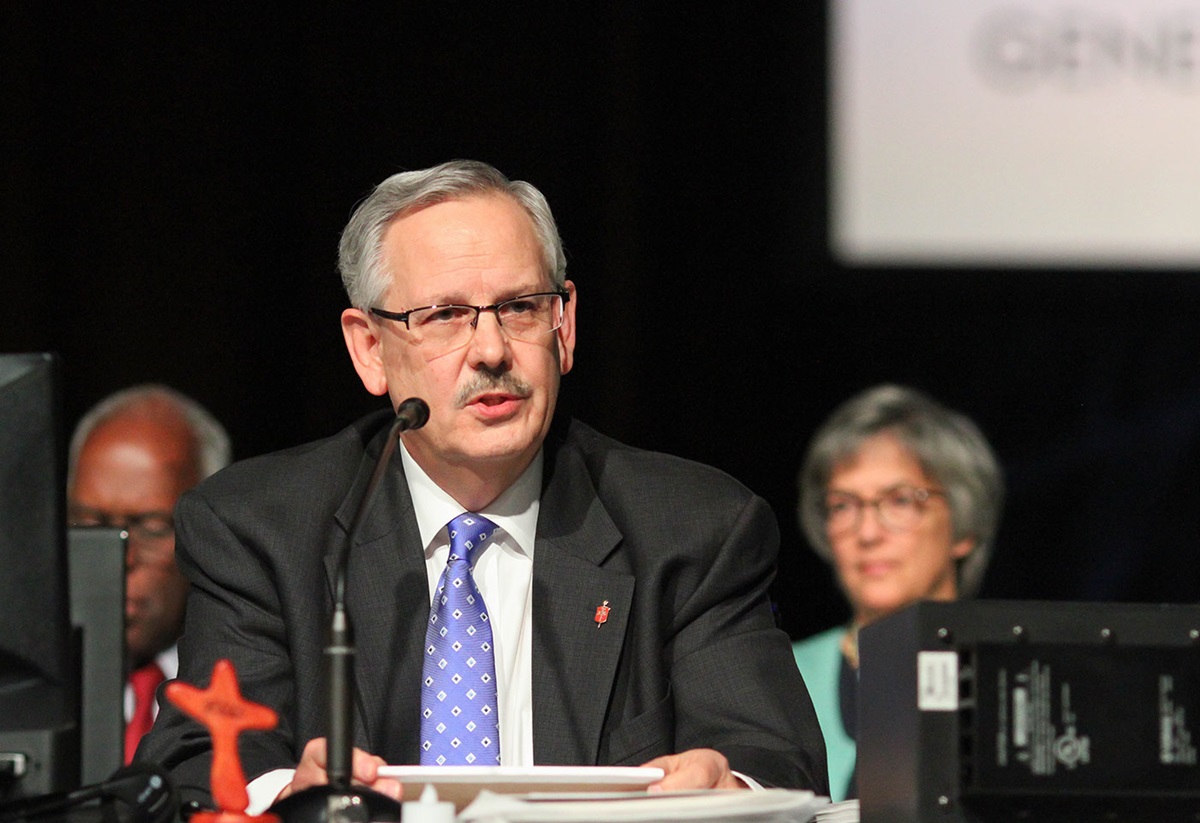The bishops’ plan to find a way forward in the church’s longtime homosexuality debate comes with a price tag.
Questions about that cost caused a blip during the afternoon plenary session.
However, the denomination’s top finance executive offers assurance that the church can pay for the bishops’ plan without altering the proposed 2017-2020 general church budget of $599 million.
Moses Kumar, the chief executive of the General Council on Finance and Administration, spoke about the bishops’ next steps during a joint May 19 meeting of his agency’s board and the Connectional Table, a denomination-wide coordinating body. Both bodies develop the general church budget.
On May 18, delegates adopted a recommendation from the Council of Bishops that included two steps with possible financial implications.
These include:
- A special commission appointed by the bishops to study and possibly propose revisions to church rules and teachings governing ministry with gay and lesbian individuals.
- A special General Conference session that bishops might call in 2018 or 2019 to deal with such proposals.
Paying for called General Conference session
The finance agency estimates a special General Conference session would cost $3.39 million for two days and $4.12 million for three days.
To pay for such a gathering, Kumar recommends shortening the 2020 General Conference in Minneapolis by the number of days used for any special General Conference session.
“If we have two days of the special called session, the 2020 General Conference will be eight days,” said Kumar, who also serves as treasurer of the General Conference. “If you’re going three days, then you’ll only meet seven days in 2020.”
The bishops and the Commission on General Conference would ultimately have to act on Kumar’s suggestion.
He added that additional costs could be paid out of the General Administration Contingency Fund. The funding for General Conference comes out of the General Administration Fund, one of the seven funds supported by church giving.
Kumar also predicts cost savings if the meeting is held in the summer, when a college campus could be used, and said using fewer breakout rooms would save money, too. He expects a special session will need less space since it will not have all the committee work of a full-fledged General Conference.
The Rev. Thomas Shinkle, a delegate from the Iowa Conference, made a motion May 19 that any special session be held at United Methodist Africa University in Mutare, Zimbabwe. General Conference delegates voted to refer that idea to the Commission on General Conference.
Kumar said Africa University would be an impractical destination simply because it does not have the space to accommodate the delegates. His estimates are based on the meeting taking place in the United States.
Any special session would use the same delegates as the 2016 General Conference unless conferences choose to elect new delegates.
Paying for a special commission
More questions remain about costs of the planned special commission. The bishops have not yet decided how many members the new commission will have or how often it will meet.
They are clear they want the commission to represent the different regions of a denomination that spans four continents and the varied theological perspectives of the church.
“If we don’t get that right, we’re not going to go anywhere, are we?” Bishop Bruce Ough, the president of the Council of Bishops, said during a press conference. “What I mean by ‘right’ is that we are going to need to have all the voices at the table, or folks will not trust or engage with anything that emerges.”
Bishops have told Kumar they expect to keep costs for the commission below $1 million. He suggested funding could come from a fund the General Council on Finance and Administration has already designated for litigation or conflict resolution.
Members of both the finance agency board and Connectional Table affirmed Kumar’s report.
General Conference discussion
The Rev. Michael Childs, a delegate from the Mississippi Conference, raised questions of funding during the May 19 afternoon plenary.
He argued that the previous day’s vote on the bishops’ plan was out of order because the finance agency and Connectional Table had not yet weighed the plan’s financial implications. He added that General Conference rules required delegates get 72 hours to reflect on financial measures.
Ough, who was presiding over the afternoon session, reminded Childs that the General Council on Finance and Administration, with delegates’ overwhelming assent, had extended the deadline to pass legislation with financial implications until 6:30 p.m. PDT May 18. Childs appealed to the body.
However, after consulting his colleagues, Ough asked Childs to sit down. Ough later apologized in open session for being rude to Childs.
Indiana Area Bishop Michael Coyner, the president of the finance agency’s board, assured delegates that the commission would not affect the general church budget.
General Conference delegates will get to hear more from Kumar during its last day, May 20.
Hahn is a multimedia news reporter for United Methodist News Service. Kathy L. Gilbert contributed to this story. Contact them at (615) 742-5470 or newsdesk@umcom.org.
Like what you're reading? Support the ministry of UM News! Your support ensures the latest denominational news, dynamic stories and informative articles will continue to connect our global community. Make a tax-deductible donation at ResourceUMC.org/GiveUMCom.




